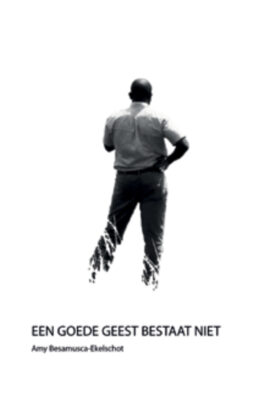Main content
By Amy Besamusca-Ekelschot
Uitgeverij Mik Schots
ISBN: 978-90-822310-1-4
NUR: 301
2018, 274 pages
Language: Dutch
Price: 20 euros, to support the work
of the NGO Kennis zonder Grenzen
(Knowledge without Borders),
www.kenniszondergrenzen.nl
When I asked my colleagues in the mental health sector what they knew about the Rwandan genocide, the movie Hotel Rwanda came up most. This movie is based on the true story of a – according to the movie – brave hotel manager of Hôtel des Mille Collines in Kigali, who was able to protect around 1,200 Tutsis from being slaughtered. The movie ends with the reunion of the main characters in a safe place outside Rwanda, and it seems they are likely to live happily ever after. The book Een goede geest bestaat niet (A good spirit does not exist) shows a different side of the Rwandan genocide.
The book follows the true story of Victor, an ordinary young man with a Hutu father and a Tutsi mother. At the start of the war, he is not considered Hutu and has to flee on foot to neighbouring Democratic Republic of the Congo (DRC). During the escape he witnesses horrible murders and deaths due to disease, hunger, thirst and fatigue. No matter how hard he tries, he can’t avoid the smell of the dead bodies. His situation is bleak: he could be killed, he sees no future for himself, and he comes close to dying a number of times.
He manages to escape Rwanda, and from DRC he moves on to Belgium, where he suffers a brief period of depression. But he recovers without any remaining severe psychiatric symptoms. He integrates well into Belgian society, gets married, and becomes a psychiatric nurse. Frequently, he talks about his past with friends and even in larger groups, but he makes sure to leave out the horrific details. When he is by himself, he often thinks back to what happened in Rwanda and feels guilty towards those who didn’t survive such as his own mother.

One of the most interesting aspects of the story is that despite all the trauma he endured, Victor is not suffering from typical post-traumatic stress disorder (PTSD), which has a particular pattern of symptoms such as flashbacks, avoidance of trauma related triggers, nightmares, and hyperarousal. Victor feels he doesn’t have the right to feel bad about what happened, because he was one of the lucky ones. He got the chance to start a new life, so he suppresses most of his feelings and does not seek any professional help to process his memories. He sends money back to family members who remained behind, which leads to confrontations with his wife. He frequently fears he may be hunted by the bad spirits of his ancestors and family and friends who didn’t make it.
Having lived in Belgium for over fifteen years, Victor returns to Rwanda to work as a psychiatric nurse for a year. Being there physically, his memories intensify and he starts experiencing nightmares and flashbacks. He keeps this to himself, still feeling that others suffered much more. He eventually finds some peace of mind by asking the spirits for forgiveness. At the end of the book, Victor returns to Belgium. The importance of including cultural aspects is emphasised by several of his Belgian friends, with whom he discusses how non-governmental organisations that received funding to help Rwanda use their Westernised explanation model for trauma, leaving out cultural aspects such as the importance of keeping good relationships with the spirits.
I would strongly recommend reading this book because I think this story should be heard. Most of the people I gave the book to so far found it hard to get through the parts where the traumatic experiences are described because of the gruesome details, but also found it important that this side of the genocide is highlighted. For doctors working with psychiatric patients, it’s hard to picture what the people of Rwanda have been through because it’s so different from reality as we know it.
What this book mostly demonstrates is the various ways psychiatric symptoms can manifest themselves in people with a different cultural background from our own. Doctors working with psychiatric patients are trained to diagnose and treat purely on PTSD as described in the Diagnostic and Statistical Manual of mental disorders, fifth edition, DSM-5. It would therefore be of great value to pay more attention to the cultural expression of psychiatric symptoms in global mental health training and most of all, to remain curious and ask open explorative questions to each of our individual patients.
Uitgeverij Mik Schots
ISBN: 978-90-822310-1-4
NUR: 301
2018, 274 pages
Language: Dutch
Price: 20 euros, to support the work of the NGO Kennis zonder Grenzen (Knowledge without Borders), www.kenniszondergrenzen.nl

















































